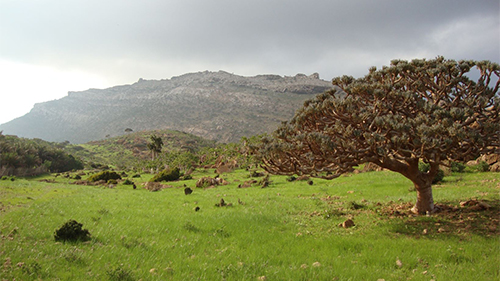Contact Center
.
24 October 2018
For the First Time the Middle East Region, The 17th International Soqotra Conference and Annual General Meeting of the Friends of Soqotra (FoS) at Bahrain National Museum


Bahrain National Museum hosts, on 25 October 2018, the 18th International Soqotra Conference, an Yemeni archipelago which is inscribed on the UNESCO World Heritage List under Natural Criterion x. the event is first and unique in the Middle East, organized by the Arab Regional Centre for World Heritage Manama, Bahrain, in cooperation with the Friends of Socotra, which will hold its annual meeting next Saturday at the National Museum of Bahrain too.
The conference will continue until 28 October and will be attended by more than 65 participants from European and Arab countries, such as UAE, Bahrain, Jordan, Kuwait, Yemen, France, Belgium and Britain, as well as many speakers and experts in natural and cultural heritage.
The conference sessions will shed lights on many issues, such “Natural and cultural linkages on Soqotra”, which will discuss many topics like the traditional cultural traditions and practices in Soqotra, biodiversity, archaeology and sustainable development. The opening ceremony will screen a movie or a short film "Socotra the Island of Djinns” by Jordi Esteva from Spain and it will be presented totally in local Soqotran language.
the 18th International Soqotra Conference and AGM of the Friends of Soqotra event seeks to emphasize the uniqueness of Soqotra in all its aspects and to raise awareness of its heritage. It presents an opportunity to meet and to learn more about past and ongoing projects and the latest scientific research related to nature (terrestrial and marine), culture (histor¬ical and current), education and sustainable development in the Archipelago.
Worth to mention that the Arab Regional Centre for World Heritage Manama hosted a workshop titled 'Integrating Cultural Heritage into Conservation and Development Planning'. It was the second workshop hosted by the ARC_WH after the last held in February 2018 as part of a two-year continuous programme. This 2-years project will address the needs of cultural heritage on Socotra, a Yemeni archipelago between Yemen and the Horn of Africa, as well as conducting activities to promote the use of the endangered Socotra language. The workshop will focus on both the training in and further protection the Socotra language through poetry competitions. The project also has a sustainable cultural tourism component, which was presented during the annual meeting ‘Friends of Socotra’. Indeed, Socotra is rich in unique biodiversity and has a range of cultural heritage, ranging from rock art and other prehistoric monuments to build heritage such as cemeteries and medieval buildings. The rapidly growing population of Socotra is being further swollen due to conflict in mainland Yemen, which is increasing the demand for development and putting heritage on the islands at risk.
The Arab Regional Center for World Heritage is working dedicatedly to preserve the neglected island which includes large numbers of plant species, reptiles, birds and marine animals that are not found anywhere else in the world and distinguish it from other natural sites.
Indeed, in 2016, the Arab Regional Centre for World Heritage (ARCWH) had also previously organized at its office in Manama an international conference meeting to discuss and develop an emergency response plan for Socotra archipelago, Yemen after 2015 cyclone. In 2016, an experts meeting was also held at the ARC_WH headquarters to discuss the best TABEA strategic plans to protect the Socotra archipelago site. In addition, the Arab Regional Centre for World Heritage (ARC-WH) launched June 2017 TABE'A II Report - enhancing regional capacities for World Heritage, and to meet the specific needs of states, stakeholders and sites within the region and ensure World Heritage contribution to IUCN's wider regional programme and the Regional Centre's strategy. In 2017, an ARC-WH delegation took part in a workshop on “ Launching the Comprehensive Program for Safeguard and Sustainable Development in Socotra Archipelago”, held in Jordan, in addition to ARC_WH’ participation in “Friends of Socotra” conference, held in Switzerland.







